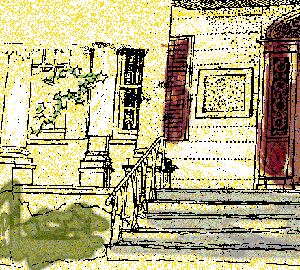They just don't get it
Get together with two or more disability activists for any length of time and the topic will come up: progressive organizations don't care a thing about disability rights. Don't understand 'em, don't want to understand them. Don't want to be bothered with access.

|
When disability activist Mark Johnson moved to Atlanta in 1986, he wanted to do organizing work for ADAPT. He first approached traditional disability groups like UCP and Easter Seals. "They weren't interested."
He then approached the Fund for Southern Communities, a community-based progressive fund that often makes grants to social action and direct change groups.
"I called them and they said a funding cycle was about to begin and to get a proposal in to them," he recalls. "Of course, when I got there, their office was inaccessible."
Johnson recalls getting to the Fund's office -- a small house -- and, finding steps to the door, driving his van across the grass to the side of the house and banging on the outside wall until somebody came out to take his grant.
Everyone in the movement has war stories of pushing some liberal group on access.
|
When famous progressives talk about 'isms -- racism, sexism -- disability is rarely part of the discussion |
Johnson got his funding -- $900 that first year, which helped the small Atlanta ADAPT group get to the Detroit "We Will Ride!" action.
He stuck with the Fund for Southern Communities. The Fund ramped its entrance. Johnson was named to its board, and in 1989 became chair of the funding group. Grants to Atlanta disability activists increased, even after Johnson left as chair; at one time the Atlanta coalition Let's Get Together got $25,000 from the group.
But with leadership changes, the group's focus shifted once again. Environmental causes eclipsed disability issues. Two years ago, the Fund moved to new, inaccessible offices. "They made a commitment to make it accessible," says Johnson, somewhat ruefully. "But it hasn't happened yet."
"I'm frustrated with liberals," says Zan Thornton, head of Disabled Queers in Action. At least with conservatives, "you expect them to not understand rights.
"But liberals say, 'How dare you!' Liberals cannot handle it when we accuse them of not respecting rights.
"The way to piss off a liberal is to say, 'you're discriminating.' They've got this 'I'm better than you because I'm liberal and I contribute to all these good causes' attitude. But their solution to inaccessibility is to drag you up steps [into a building]. They'll 'help' you."
Both liberals and conservatives, says Thornton, are all too willing to "help." What irks her is that liberals do not seem to really try to understand about rights when it comes to disabled people.
Johnson's story is repeated in many communities. In Louisville in the early 1980s, disability activist Charlie Pratt became active in Kentucky's American Civil Liberties Union chapter, eventually becoming its chair. During his tenure, the ACLU in Kentucky undertook pioneering voting access lawsuits and had some influence on the national ACLU board in disability rights matters. In the years after Pratt's death, the group's interest in disability rights waned and then seemed to disappear altogether.
"When famous progressives talk about 'isms' -- racism, sexism -- disability is rarely part of that discussion," says ADAPT's Robin Stephens. "Progressives don't want to deal with our issues at all."
Stephens works with a progressive funding group on the national level. "They have a very elaborate affirmative action policy -- which, of course, doesn't include disability." When Stephens proposed that they change the policy to include disability, they agreed. Two years later, nothing had happened with the policy.
Thornton is on the board of her local chapter of the American Civil Liberties Union. The building in which they hold meetings has a 2-step entrance. Even at the ACLU, says Thornton, it seems disability rights are viewed as "special rights" -- the same attitude activists get from right-wing disability rights opponents. "It's the same thing the Christian Coalition is saying," says Thornton.
Stephens says she realized last June "just how much the local group 'didn't get it' " when her group's board met to discuss their investment policy. "I suggested they avoid investments with corporations involved with nursing homes, assisted living facilities and group homes. Half the board freaked out. 'Oh, nursing homes are good places ...' 'I used to work at a group home ...' -- the usual bullshit."
|
I suggested they avoid investments in corporations involved with nursing homes. They freaked out. 'Nursing homes are good places ...' |
When the ACLU refused to hire registered interpreters for a recent meeting, Thornton, who can interpret, was pressed into service. Deaf advocates who attended the meeting left when Thornton had to take a break; the ACLU had not wanted to spend the funds to guarantee a back-up interpreter.
It sometimes "seems that progressives will never learn," says a frustrated Stephens.
"It always takes someone being 'in your face,' " Johnson says. It doesn't seem to happen any other way. "When I was on the Fund's board they put access first," he added.
Now it seems things at the Fund, like so many progressive groups, are back to inaccessible as usual.
Eleanor Smith of Concrete Change (see D.R. Nation, page 5) had a grant due in September; she couldn't hand deliver it because the Fund's office, after 2 years in its new location, is still blocked by steps. Smith questions the group's commitment to access, given that they installed an electronic gate into their parking lot in order to keep out "vagrants" but said they could not find funds to ramp a 2-step entrance.
Sometimes disability advocates try to get funding groups to make their grantees sign a commitment requiring access as a condition of receiving funds. Even that is difficult to get funders to do, says Thornton. They may have their grantees sign such a form, but rarely do they hold the group to its word; rarely is lack of accessibility grounds for withholding grant money.
"And yet all these folks are very nice people," says Thornton. "But they are very misguided."
Stephens lists frustrations most activists have faced in dealing with progressive groups: When the disability community tries to hold an educational seminar, nobody comes. Or they get angry if the seminar isn't free. When progressives form coalitions to deal with a social issue, and disability activists join, nobody wants to deal with access issues, hire interpreters, use alternative formats to print.
|
Deaf advocates left the meeting. The ACLU had not wanted to hire a back-up interpreter. |
Is there some "greater scheme" at work that none of us knows about, where people in progressive movements actively dislike disability rights? Johnson thinks not. "It's like anything else. The squeaky wheel gets the grease. They can be nice, well intentioned people, but . . . It's not like my presence alone was enough," he says, referring to his experience with the Fund for Southern Communities. Even having a relationship with someone at a progressive organization isn't enough. "We needed both."
Johnson also warned about the tendency of some disability activists to ignore other social justice issues. What kind of a message does it send to environmentalists, he says, if we hold a meeting and use styrofoam cups? "You've still got a lot of folks waiting to see if you're involved in other [progressive] issues."
Johnson makes a distinction, too, between his experience in Georgia with a progressive funding group and other situations. Funders are one thing; progressive leaders are another, he suggests.
He recalls ADAPT's frustration at its Detroit bus demonstration in the mid 1980s when civil rights icon Rosa Parks, who achieved fame for her insistence on the right of blacks to ride buses like whites, refused to lend support to ADAPT's march for their right to ride buses -- and for Jesse Jackson's lack of interest in lending support.

|
"It's been an ongoing frustration," said Johnson. But he also called that 1987 effort to get traditional civil rights leaders to lead an ADAPT action a case of "giving away our power." The disability movement could do things on its own, with its own power, he said.
Johnson said he had never seen the disability movement "sit down and have a bigger conversation about 'why.' " So he posed some of those questions for himself:
"I've asked myself, It is because we haven't been involved in civil rights as long? Is it that people just don't care? Or that they think it's the not the same form of oppression? Is it because it's easier to see oppression abroad than at home?
There's still a step in front of the Southern Christian Leadership Conference office, said Johnson, referring to an issue that's been a sore spot with the Atlanta disability community for a decade.
"You can't assume that just because they're for one progressive issue, they're for our issues," said Johnson. "You can't assume that they're going to 'get it' about disability rights."


